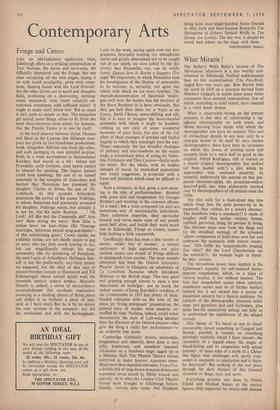Contemporary Arts
Fringe and Centre
LIKE an old-fashioned egalitarian tract, Edinburgh offers us a striking juxtaposition of Two Nations, the haves and have-nots, the Officially Sponsored and the Fringe. See one class occupying all the best stages, laying it on with lavish prodigality, given civic recep- tions, shaking hands with the Lord Provost! See the other driven out to small and draughty halls, producing on a shoestring, unrecog- nised, unassisted, even (most unfairly) un- endowed, sometimes, with sufficient talent! It ought to make one's blood boil. But as usual it isn't quite so simple as that. The categories get mixed; some things refuse to fit. Even the most class-conscious must admit, for instance, that the Piccolo Teatro is in one by itself.
In the brief interval between Dylan Thomas and Shaw at the Lyceum this Milanese com- pany has given us two brand-new productions, fresh, altogether different one from the other, and each springing its own splendid surprise. Both, in a week surrendered to International Kulchur, bad scared us a bit: before late Pirandello, early Goldoni, stout hearts cannot be blamed for quailing. The Inglesi Italiani could look knowing; the rest of us turned anxiously to the synopsis of Arlecchino and learned that 'Pantalone has promised his daughter Clarice to Silvio, the son of Dr. Lombardi. At this moment Arlecchino announces the arrival of his master Federigo, to whom Pantalone had previously promised his daughter. Federigo enters, but actually it is not he, but his sister Beatrice. . . Oh Lord! All this and the Commedia dell' Arte too? How wrong we were! How false a notion have we had—from Old Vicarage interludes, laborious period song-and-dance- of this exhilarating game! Comic masks,. we suddenly realise, are not chiefly meant to gag an actor who has little worth hearing to say, but can magnificently enlarge his stage personality (the sly doddering of Pantalone, the zany's grin of Arlecchino). Harlequin him- self is not the peelie-wally, airy-fairy person we supposed, but the chief of that race of peasant-boobies (cousin to Hanswurst and Till Eulenspiegel) whose animal spirits even the twentieth century cannot subdue. Marvello Moretti is, indeed, a clown of extraordinary accomplishment (his acrobatic tomfoolery mounting to a clashing climax of flying plates and dishes is as brilliant a piece of slap- stick as I have seen). But he is by no means the only virtuoso in the company; nor did the revelations end with the harlequinade. Later in the week, poring again over our pro- grammes, feverishly keeping our metaphysics warm and grimly determined not to be caught out of our depth, we were jolted by the dis- covery that Pirandello, too, can be wildly funny. Questa Sera Si Recita a Soggetto (To- night We Improvise), in which Pirandello took his investigation of the illusion of personality to its extreme, is, certainly, not quite like others with which we are more familiar. The charade-demonstration of theatrical 'reality' gets well over the border into the territory of the Marx Brothers (it is here, obviously, that they got half their ideas for A Night at the Opera, Anvil Chorus, scene-shifting and all). But it is easy to imagine the heavy-handed solemnity with which it might be handled; robbing us not only of some wonderful moments of pure farce, but also of the full effect of those passages of genuine and fearful tragedy to which they cunningly lead the way. These—especially the last dreadful duologue of jealousy and near-madness on the empty stage, a tremendous piece of acting by Valen- tina Fortunato and Tino Carraro—fairly made me sweat. But the whole, with its sudden changes of mood, its unabashed pantomime and ironic suggestion, is projected with a force and precision which must be difficult to equal.
Such a company, in fact, gives a new mean- ing to the idea of professionalism: directed with great skill and imagination (by Giorgio Strehler) and working, in the common phrase, 'as a team'; but a team composed (as ours are sometimes not) of unmistakable individuals. Their collective expertise, their particular bounce and verve make most of our people seem half alive; and beside their work much else in Edinburgh, Fringe or Centre, cannot help looking a little amateurish.
Unofficially there has been a fine variety of matter, rather less of manner: a certain uniformity of high . aspirations not quite realised makes one strand of Fringe difficult to distinguish from another. The most notable enterprise has been the Oxford University Players' Storm in Shanghai, an adaptation of La Condition Humaine which introduces Malraux to the British stage. This was good and gripping enough almost to open a new department of nostalgia: not so much the violent events—Chiang Kai-shek's crushing of the Communists in 1927 has plenty of back- handed relevance still—as the tone of the piece, its 'living newspaper' presentation, the general aura of Auden, seem tenderly un- muffled by time. Nothing, indeed, could better demonstrate the state of Left-wing idealism than the devotion of the Oxford players—who give the thing a really fine performance—to an evidently lost cause.
Cambridge University Actors, meanwhile. pragmatical and cheerful, have done a very jolly, boisterous, and somehow innocent Alchemist on a Jacobean stage rigged up in a Masonic Hall. The Phoenix Theatre Group contrived to make Samson Agonistes some- thing more than dignified utterance. Twice Five. a double bill of long-drawn domestic drama and expanded revue sketch by Philip Guard, was scarcely up to what the London Club Theatre Group have brought to Edinburgh before. Finally, various solo turns. Nel Oosthout doing Saint Joan single-handed; Sonia Dresdel in Miss Julie and Jean-Jacques Bernard's The Springtime of Others; Donald Wolfit in The Strong Are Lonely. The last two, it should be noted, had others on the stage with them.
CHRISTOPHER SMALL


































 Previous page
Previous page